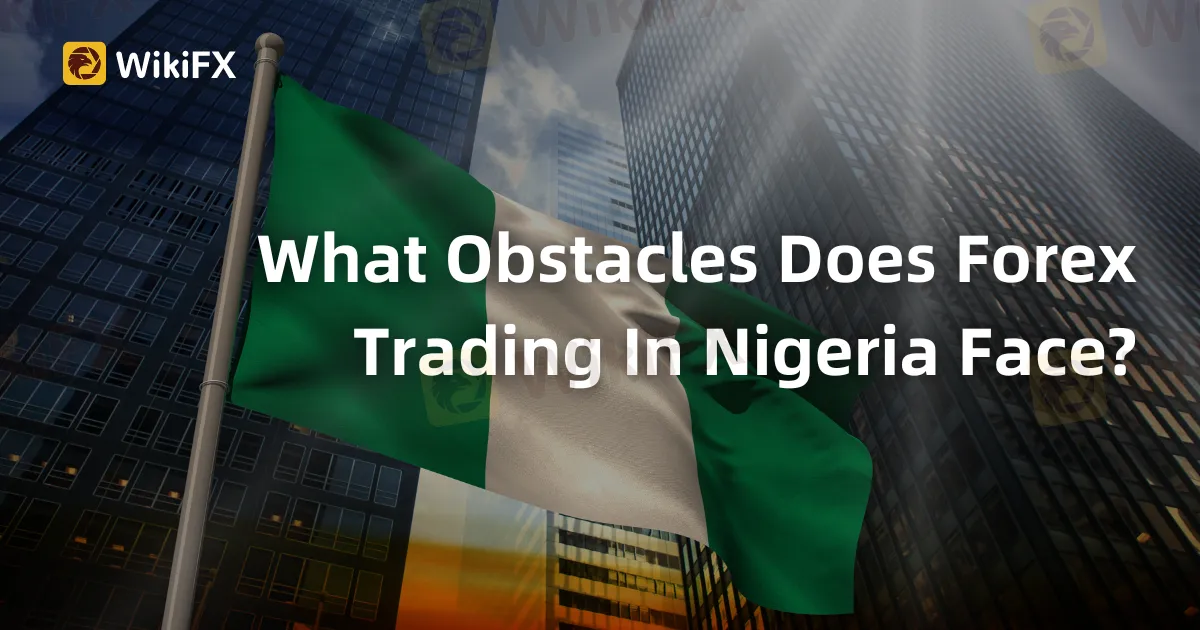简体中文
繁體中文
English
Pусский
日本語
ภาษาไทย
Tiếng Việt
Bahasa Indonesia
Español
हिन्दी
Filippiiniläinen
Français
Deutsch
Português
Türkçe
한국어
العربية
What Obstacles Does Forex Trading In Nigeria Face?
Abstract:Forex trading is a popular investment opportunity for individuals and businesses worldwide. In Nigeria, forex trading has gained popularity over the years, with many people seeking to make a profit from buying and selling foreign currencies. However, forex trading in Nigeria comes with its challenges, and traders need to be aware of them to make informed decisions.

Forex trading is a popular investment opportunity for individuals and businesses worldwide. In Nigeria, forex trading has gained popularity over the years, with many people seeking to make a profit from buying and selling foreign currencies. However, forex trading in Nigeria comes with its challenges, and traders need to be aware of them to make informed decisions.
Forex Trading in Nigeria: Regulatory Risks and Liquidity Challenges
One of the significant challenges of forex trading in Nigeria is the issue of regulations. The forex market is largely unregulated in Nigeria, and this poses a significant risk to traders. There is no central regulatory body that oversees the forex market, and this makes it difficult for traders to determine which brokers and firms are reputable. This lack of regulation has led to fraudulent activities in the forex market, such as Ponzi schemes and fake investment schemes, which have led to significant financial losses for many traders.
Another challenge of forex trading in Nigeria is the issue of liquidity. The forex market in Nigeria is relatively small compared to other global markets, which means that there is limited liquidity. This makes it difficult for traders to execute large trades, and this can affect the profitability of their trades. In addition, the lack of liquidity in the market can lead to significant price fluctuations, which can be difficult for traders to predict.
The high level of volatility in the forex market is also a challenge for traders in Nigeria. The forex market is known for its high level of volatility, which means that prices can fluctuate rapidly and unpredictably. This can make it difficult for traders to make informed decisions about when to enter or exit trades. The high level of volatility also increases the risk of losses for traders, especially those who are new to forex trading.
Top 4 regulated Fx brokers based on the WikiFX evaluation



Saxo Bank

Challenges of Forex Trading in Nigeria: Infrastructure and Scam Risks
Forex trading in Nigeria also faces challenges in terms of infrastructure. The country's forex market infrastructure is not well developed, and this can make it difficult for traders to access market data and execute trades. This lack of infrastructure also affects the speed of trade execution, which can be slow, especially during peak trading hours. This can lead to missed opportunities and losses for traders.
The issue of forex scams is another challenge of forex trading in Nigeria. Forex scams are prevalent in Nigeria, and traders need to be aware of them to avoid falling victim. These scams often involve fake investment schemes that promise high returns in a short period. Traders are often required to make a deposit before they can start trading, and once they do, they discover that their funds have been lost.
Finally, forex trading in Nigeria faces challenges in terms of access to capital. Forex trading requires significant capital to start, and not all traders have access to this capital. This limits the number of traders who can participate in the market and can affect market liquidity. The lack of access to capital also means that traders who do participate in the market are at a disadvantage compared to traders who have more significant capital.
Install the WikiFX App on your smartphone to stay updated on the latest news.
Download link: https://www.wikifx.com/en/download.html?source=fma3

Disclaimer:
The views in this article only represent the author's personal views, and do not constitute investment advice on this platform. This platform does not guarantee the accuracy, completeness and timeliness of the information in the article, and will not be liable for any loss caused by the use of or reliance on the information in the article.
Related broker
Read more

Italian Regulator Warns Against 5 Websites
The Italian regulator, CONSOB has issued a warning against five websites offering unauthorized financial services. This regulatory action aims to protect the public from fraudulent activities.

Trader Exposes Unethical Practices by STP Trading
A recent allegation against STP Trading has cast doubt on the firm's business practices, highlighting the potential risks faced by retail traders in an increasingly crowded and competitive market.

What Makes Cross-Border Payments Easier Than Ever?
Cross-border payments are now faster, cheaper, and simpler! Explore fintech, blockchain, and smart solutions to overcome costs, delays, and global payment hurdles.

FCA Identifies Clone Firm Exploiting Admiral Markets' Credibility
The UK Financial Conduct Authority (FCA) has issued a public warning regarding a fraudulent entity impersonating Admiral Markets, a legitimate and authorised trading firm. The clone firm, operating under the name Admiral EU Brokers and the domain Admiraleubrokerz.com, has been falsely presenting itself as an FCA-authorised business.
WikiFX Broker
Latest News
Hackers Charged for $11M Crypto Theft Using SIM-Swaps
Role of Central Banks in the FX Market
FCA Alerts Against Sydney FX
What Makes Cross-Border Payments Easier Than Ever?
Trader Exposes Unethical Practices by STP Trading
Bitcoin Nears $100,000: A Triumph of Optimism or a Warning Sign?
Malaysian Man Loses RM113,000 in Foreign Currency Investment Scam
Mastercard Partners with JPMorgan for B2B Cross-Border Payments
FCA Identifies Clone Firm Exploiting Admiral Markets' Credibility
Coinbase Under Scrutiny Amid Wrapped Bitcoin Delisting Controversy
Currency Calculator


